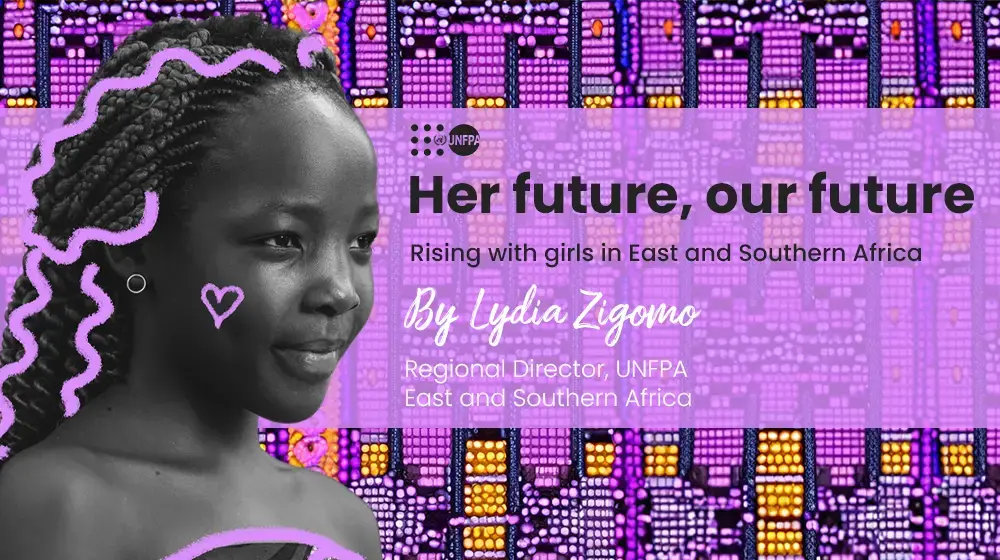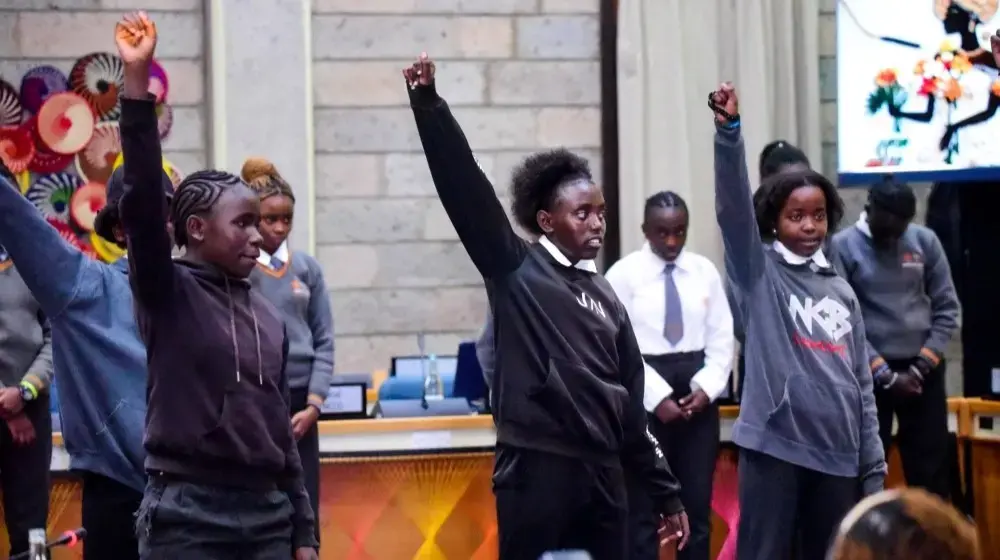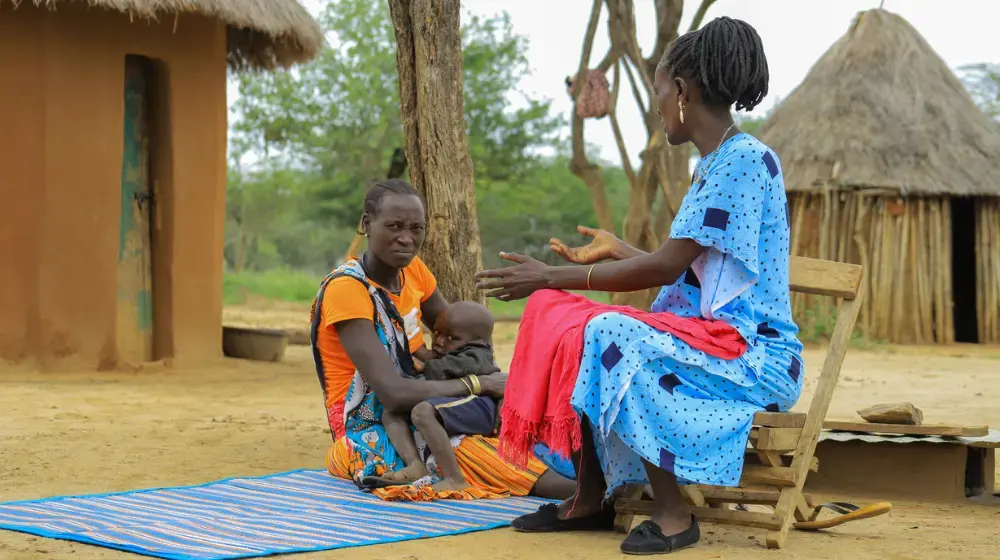JOHANNESBURG, South Africa—“People, especially men, need to understand that it is an equal human right for a young girl and a woman to live her life and have full autonomy of her body. It is not men who should be making decisions for her.”
These were the words of Bhanu Prabrakal, spoken at a discussion on harmful practices, organized by UNFPA and UNICEF to commemorate International Day of Zero Tolerance to Female Genital Mutilation (FGM) on February 6.

Mogadishu' speaks volume about how FGM is a harmful that needs
to end. © UNFPA ESARO/Quintin Mills
Mr. Prabrakal was at loss for words after seeing A Girl from Mogadishu, a movie based on the personal experiences of Ifrah Ahmed, a Somalian who made the extraordinary journey to escape war-torn Somalia after being subjected to FGM.
The film paints a vivid picture of just how serious FGM is as a harmful practice. It follows a moment in her life as she emerged as one of the world's foremost international activists against gender-based violence and FGM.
This screening in Johannesburg was the South African premiere, following the global premiere organised by UNFPA at the Nairobi Summit on ICPD25 in Nairobi in November 2019. It touched many of those who watched it.
“I am really shocked, as a man, that we still have high prevalence rates of FGM on the continent and that certain groups still practice FGM in countries such as South Africa, where one would never have thought it is practised,” said Clive Mathibe.
Said Mpiwa Mangwiro, Sonke Gender Justice Regional Campaigns and Advocacy Specialist: “It’s a very sad and painful thing to think that in this day and age we [communities] still have harmful practices like FGM; that up to now we [women] still don’t have autonomy over our bodies. Our bodies are still being policed, our bodies are still being controlled – this is a serious violation.”

perpetuate FGM. - Mpiwa Mangwiro, Sonke Gender Justice.
© UNFPA ESARO/Quintin Mills
To take strong action to end this harmful practice, for the past decade UNFPA and UNICEF have run the Joint Programme to End Female Genital Mutilation. This has helped more than 3.2 million girls and women receive prevention, protection and care services related to FGM, to date.
However, based on population growth projections, 68 million girls are at risk of undergoing FGM between 2020 and 2030 unless governments, civil society actors, traditional and religious leaders, and community members, in particular men, accelerate action to end FGM by 2030.
Why engage men and boys to end FGM by 2030?
“We [women] are at the […] mercy of our male counterparts because FMG in some community is a factor of marriageability, although in that marriage, most victims of FGM are not even able to fully enjoy intimacy,” Ms. Mangwiro said.
“It is important for men, in particular young boys as future leaders, to come on board as we engage them on gender norms that perpetuate FGM and be part of the solution to ending this harmful practice,” she added.

critical because men are the perpetrators of several forms of violence
against women due to harmful social norms.need to be at the
forefront of ending FGM by 2030. © UNFPA ESARO/Quintin Mills
Men and boys’ engagement is critical because men are the perpetrators of several forms of violence against women due to harmful social norms. Local communities should strive to shift such harmful social norms to avoid the creation of ‘toxic masculinity’ – a phenomenon of perceived male privilege and power that fuels FGM and other forms of harmful practices against women and girls.
“Men need to change the narrative and the way they [men] speak of women, and how they speak about violence against women. More men need to start to show up and take a stand to end FGM and all other harmful practices that are perpetuated against women and young girls,” Mr. Mathibe said.
Rachel Jewkes, Executive Scientist for Research Strategy at the South African Medical Research Council, spoke on a panel discussion about ending FGM prior to the film screening. “This must be the decade of ending FGM and all forms of violence against women and girls,” she urged. “We need to intensify programmes that embrace elements aimed at changing the patriarchal structure of society, since FGM and all forms of violence against women and girls are deeply rooted in that.”
“But it’s also critical that we follow the evidence, follow the research, and we learn from what actually has been shown to work in areas where levels of FGM have been greatly reduced. We have experience on the ground with interventions that can work, in communities that challenge harmful norms, and challenge harmful practices within communities,” she said.
Why we need to accelerate action to end FGM
FGM is a serious violent of women’s human rights. This harmful practice is also linked to other forms of violence against women and girls. The practice undermines the health of women as well as their ability to effectively engage in society.
Caroline Mbi-Njifor, Country Director for IPAS South Africa, agrees: “FGM is an imposition of one’s belief onto another, that has harmful, intricate bodily effects for young girls and women, such as complications at childbirth, affecting their current and future choices.”
“We need to get people in the community to understand why we need to end FGM, as [this] will have a positive impact on the development of women. Again, we need to change the way communities see women and view gender relations,” Ms. Jewkes said.
Napo Masheane, a cultural activist who gave an inspirational spoken word performance at the event, said: “It’s heavy to know that women’s bodies are still a battlefield on different levels and this has to stop. It’s high time that we all play a role to ensure that laws are actively implemented to protect millions of young girls.”
- Derick Nyasulu with additional reporting by Julie Diallo





